- Home
- Thomas H. Cook
Sacrificial Ground Page 3
Sacrificial Ground Read online
Page 3
Once he’d cut the picture out, he shoved it into his coat pocket, leaned back in his chair and allowed his eyes to roam the surrounding room. He’d felt alone after Caleb left, but he suddenly realized that the room was dotted with plainclothes and uniformed policemen. They milled about in the far corner, and stood idly by the water fountain. He could hear the low hum of their conversation and the clatter of their typewriters as they moved through the motions of their separate investigations. The air was thick with the heavy smell of cigars and cigarettes. There was something raw and terribly male in the atmosphere, a grim potential for sudden, annihilating violence against which the pastel, parti-colored wall seemed as hopelessly out of place as a circus tent in a slaughterhouse.
To escape, he retrieved the photograph of Angelica and laid it flat down on his desk. For a moment he concentrated on her face. She had the beauty of a young girl on the brink of womanhood, waiting for experience, perhaps hungry for it, but still in some odd, indiscernible way, innocent and unknowing. It was a quality he’d seen in girls far less well-off than Angelica must have been. He’d seen it in the faces of fifteen-year-old hustlers. It didn’t matter what they’d seen or done, or what had been done to them. The innocence remained. It was in their youth, and it stubbornly maintained itself in every young girl’s face. It was a look in their eyes, a sense of something still salvageable no matter how much it had already been ruined, abused, wasted. It stayed as long as youth remained, and left when it was gone. There were times when he’d looked up from his newspaper and caught that same look in Sarah’s eyes. He’d seen it unobserved as she’d sat, staring vacantly at the television, her legs drawn up into the big orange chair, and he thought now that the birds must have seen it too as they leaped about the limbs above her, and watched that innocence fade day by day to black.
He stood up quickly and walked out onto the street. The heat closed around him like a fist, and for a moment he wanted only to plunge through it into another, cooler world. He imagined the wide boulevard of West Paces Ferry Road to be exactly that kind of world: spacious green lawns, bright blue swimming pools that glinted in the summer sun, a place where the grit of the city fell away as surely as the heat, and there was only the deep, consoling quiet and the cool, engulfing shade.
Angelica Devereaux had been born into such a place, Frank thought, as he made his way down to the garage and pulled himself in behind the wheel of his car, but she’d ended up in a different world altogether, a seedy, vacant lot on Glenwood Avenue.
As he pulled into the steady downtown traffic of Peachtree Street, Frank realized that the most logical explanation for Angelica’s journey from West Paces Ferry to Glen wood Avenue was also the most obvious: she was a rich girl who had a taste for slumming. He’d seen that before, too, an attraction for the low-rent world of seedy hotels and backstreet clubs. Something flourished in such places that lay dormant in the stately mansions of the Northside, a rough, teeming life that cocktail parties and debutante balls could not match for action and adventure. From time to time, young boys or girls would dip their toes into that seamy current, then a foot, then a leg, until they were way over their heads in the swirling peril of a life whose lethal undertows they could not possibly imagine. They washed up on strange shores, gambling dens, crack parlors, redneck bars and whorehouses. He’d seen perhaps a hundred such people in his time, girls named Porsche or Mercedes, as if for the family cars, and boys named Carlton and Royal, “hotel names,” as Caleb always called them. “Hotel face down,” he’d say, when one of them would not go home again.
He pulled out his small green notebook and flipped open the first page. He jotted down the name and address Caleb had given him: Karen Devereaux, 255 West Paces Ferry Road. Beside Laura Angelica, Karen sounded as blunt and snub-nosed as Frank’s own name, and he almost immediately imagined her as the ugly duckling with the beautiful sister, the one for whom the family had never had much hope.
He pressed down on the accelerator as the traffic cleared slightly near Buckhead. Karen Devereaux. He repeated the name but could find nothing to go with it. He knew only that whoever she was, her life was about to take a dreadful turn. She would soon be told of her younger sister’s death, then be driven back downtown to identify the body. He had seen men and women snap like small twigs at such moments. Years before, he had brought a middle-aged woman downtown. She had been small, slight, so weak that she’d appeared almost breathless at the top of the stairs. Her son had been killed by a drunken driver and his body lay in one of the refrigerated vaults the police used as makeshift morgues. She’d stared at her son’s face for a long time, utterly silent as she gazed rigidly at the half-crushed skull. Then suddenly, she’d whirled around with terrific speed and slapped Frank’s face with all her womanly might. He had actually staggered backward, the heat of her hand still on his skin, his eyes watching, startled, as she’d pressed her back against the wall, slid slowly down and crumpled to the floor.
He was still vaguely thinking of her as he arrived at the Devereaux house. The driveway was circular, and it curved gently in a wide are around a broad field of neatly pruned shrubs. A line of azaleas bordered it, their bright red flowers shining brightly.
The house looked as if it had been built with something religious in mind, and as he stepped out of the car and stared up toward its tall white columns, Frank thought of the tiny wooden church in which his father had struggled to save the souls of those tormented, guilt-ridden farmers who came to him. The Devereaux house gave off the sense of people who had already been saved from most of the ordinary trials of life. Here no one had ever worried about an early frost or too dry a summer. It rose over the surrounding green as if it held dominion over everything around it. The tall columns stretched up to a wide portico, and the white facade which rested in its shade seemed almost smug in its serenity. It looked like the kind of grand, spacious place which invading armies chose to house their commanding officers, and Frank could easily imagine the conquering Yankee generals who might once have tethered their horses to its tall pillars.
An enormous oak door opened at the second ring of the bell. Frank had expected to see a butler in a black coat, but instead he found a young woman in a paint-dappled artist’s smock and tattered blue jeans. She wore unpolished brown loafers, and her long black hair was gathered casually in the back, where it hung in a wild confusion of unruly curls.
She looked at him questioningly, as if he’d ended up at the wrong entrance.
“Yes?” she said.
“Is this the Devereaux house?”
“Yes, it is.”
“I’m looking for Karen Devereaux.”
“And you are?”
Frank took out his badge. “Frank Clemons.”
The woman nodded slowly. Her dark eyes narrowed somewhat as if she were putting it all together, the dusty, bartered car, the dusty, battered man in his rumpled brown suit, his swollen, bluish eyes, the bent and tarnished badge.
“I’m Karen Devereaux,” she said finally. “What’s wrong?”
“Would you mind if I came in?” Frank asked hesitantly.
“All right,” Karen said. She stepped back and allowed Frank to walk into the foyer. It was painted white and decked with the portraits of what he guessed to be the more distinguished figures of the Devereaux family, senators, judges, planters, members in good standing of what Caleb always called “the moonlight and magnolia crowd.”
Frank reflexively took off his hat and twirled it awkwardly in his hands.
“I’m afraid I have some very bad news for you,” he said.
She drew in a slow, calming breath. “I’ve been through this before,” she said.
“Through what?”
“Bad news,” Karen said. “My parents were killed in an air crash in Europe. I was just a young girl at the time. A man like you came to the house. He took off his hat like you did, and he kept it in his hands. He kept glancing down at it while he told us.” She lifted her face slightly, as if trying to brac
e herself. “What is it this time?”
“Your sister.”
“Dead,” Karen said. It was not a question. It was a statement of fact.
“Yes.”
Her reaction was a silence so absolute that it seemed to draw everything else into it. Her eyes stared placidly into Frank’s, and her lips tightened, as if in a determined effort to hold back the scream that might have broken through them.
“We found her body early this morning,” Frank said.
Karen stepped back and grasped the edge of a small table. Her eyes darted from one portrait to another, as if she were communicating this latest family tragedy to the lost, ancestral dead.
“We’re not sure what happened to her,” Frank added after a moment.
She looked at him. “Not sure?”
“No.”
“It was some sort of accident?”
He decided to go easy. “We don’t know,” Frank told her. “We just found her body early this morning.” He waited for her to speak. She didn’t. “Off Glenwood Avenue,” he added.
“I see.”
“Did you notice that she didn’t come home last night?”
“No.”
“Does she live here, Miss Devereaux?”
“Yes, she does,” Karen said. “A room upstairs.” She drew her hand from the table, and Frank could see the marks her nails had left on its polished surface.
“You’ll have to come downtown and identify the body,” he said.
“Officially, you mean?”
“Yes.”
“So there’s no doubt that it’s my sister?”
“No doubt. We have a tentative identification from the yearbook at Northfield. She did go to Northfield, didn’t she?”
“Yes.”
“I could take you downtown now, Miss Devereaux,” Frank said. “Or, if you’d rather wait …”
“No,” Karen said immediately, “I’d rather go now. I don’t want to wait.”
“All right.”
“Just let me change,” Karen said.
“Of course.”
“I’ll be right down.”
“There’s no rush,” Frank told her. He smiled sadly. “I’m very sorry to have to tell you all this.”
Karen turned quickly and darted up the stairs.
Alone in the foyer, Frank allowed his eyes to settle on the room. He noticed the immaculately polished table, and the large porcelain vase that rested on top of it. There was a large enameled box beside the vase, black, but with a scene of what looked like European peasants painted on it. Absently, before he could stop himself, Frank opened it. It had a dark red velvet lining, and he ran his finger over it quickly, then closed the lid. He turned his head slowly to the right, and looked at a large portrait of a tall, gray-haired man in a dark blue wing-backed chair. The man sat in a large, book-lined room, and there was a look of enormous pride in his eyes. Perhaps the pride came from his money, or his power, or even from the books which surrounded him, all the vast learning they represented. It was a hard face to read, but in that, it was simply like every other human face. They came in all sizes and configurations, and they divulged nothing. The proud gray man in the book-lined room might be anything, anything at all.
Frank drew his eyes from the portrait and down toward the oriental rug at his feet. He saw Angelica Devereaux’s pale, dangling arm as if it were lying among the swirls of red and blue, distinct, yet indistinct, part of an indecipherable intricacy. “Farther along we’ll know more about it,” he heard his father sing madly at the altar of his mind. “Farther along, we’ll understand why.”
4
Karen Devereaux looked quite different when she reappeared a few minutes later. The soiled artist’s smock had been replaced by a long black skirt and dark red blouse. She had unpinned her hair, and it now hung loosely at her shoulders. She looked somewhat younger because of that, but the emotions Frank had seen rising into her face now seemed even more forcefully contained.
“I’m ready to go now,” she said, almost stiffly, and with an air of quiet command.
Frank stepped to the door immediately. “We’ll take my car,” he told her.
“Yes, all right,” Karen replied, “I’d really prefer not to drive right now.”
For a time, Frank kept quiet as he drove back toward the city. The wide, shaded lanes no longer seemed as imposing as they had earlier. It was as if something of their invulnerability had been taken from them. The armor of wealth had not been able to protect one of their youngest and most beautiful, and the failure reduced their grandeur, brought them down to human scale once again.
“It is beautiful out here,” he said quietly.
Karen said nothing.
“Never seems as hot as it is in the city.”
“We have our days,” Karen said crisply.
Sitting beside him, her large dark eyes fixed on the road ahead, she seemed extraordinarily composed, considering the news he’d just brought her. She kept her shoulders lifted slightly and her hands folded gracefully in her lap, and as he looked at her, Frank thought that perhaps in a continually shifting and uncertain world, she had learned that only her dignity could be kept in place, that it was the only thing in her life over which she truly had full and personal control.
“There’ll be questions, of course,” he said.
Karen continued to stare straight ahead. “Yes, I suppose so.”
“And it’s important to move quickly in something like this,” Frank added.
“Yes.”
“I’m sure you have a few questions, too,” Frank said, still hoping to draw her out, but without coming on too fast.
“You said you didn’t notice that she didn’t come home last night,” he said, finally.
“No, I didn’t.”
“Is that unusual?”
“That she didn’t come home, or that I didn’t notice it?” Karen asked.
“Both.”
“She had her own room,” Karen said stiffly.
“And her own life?”
“Yes, that too.”
“What did you know about it?”
“That she kept it to herself.”
“What about friends?”
“I don’t know if she had any.”
Frank looked at her doubtfully.
“I mean, if she had friends, I don’t know who they were,” Karen explained.
“Other kids, maybe. Didn’t anyone ever come by to see her?”
“Not that I know of,” Karen said. “I have a studio in the back of the house. I spend a lot of time there. People could come and go; I wouldn’t see them.” She shrugged. “But as far as I know, Angelica was very isolated.”
“It sounds like you are too,” Frank said, before he could stop himself.
Karen looked at him sharply. “Maybe I am. So what?”
“Look, I know how people can lose touch,” Frank said quickly. “In families, I mean. They can lose touch. My own daughter. It’s just that it was only the two of you in the house. That’s right, isn’t it? Only the two of you?”
“Yes.”
“So you had to have some contact,” Frank said. “No matter how little, there had to be some.”
Karen said nothing. She turned back toward the street and stared straight ahead.
“When a doorbell rings,” Frank went on, “someone has to answer it. Was there ever someone there who was looking for Angelica?”
“No,” Karen said crisply.
“Never?”
“Not when I was there, no,” Karen repeated firmly. “Maybe somewhere else, she had friends.”
“On the Southside?” Frank asked pointedly.
Karen did not reply.
“Do you know what Glenwood Avenue looks like?” Frank asked.
“Vaguely,” Karen said, almost in a whisper.
“Then you know it’s not exactly West Paces Ferry.”
“I’m aware of that, yes.”
“We don’t know exactly what happened to your si
ster,” Frank said, “but she ended up a long way from home.”
Karen said nothing. She kept her eyes on the road ahead.
As he glanced at her from time to time, Frank tried to come up with some idea of what she had felt for her sister. He’d had enough experience to know that it was hard to tell where love began or ended in a family. His own mother had appeared to love his father, and yet on one raw afternoon she had simply disappeared, left him with two boys on the brink of manhood and not so much as a note to tell them why.
“I know how it is sometimes,” Frank said tentatively. “Sometimes, people just don’t get along. Blood’s not everything. I know that, believe me. But you did live in the same house as your sister.”
She turned toward him. Her eyes widened somewhat, as if she were seeing him for the first time.
“What happened to you?” she asked.
For an instant he thought she meant his life, what had happened to his life, but then he realized that she was asking about his face, the scars and bruises. He touched his left eye and winced slightly.
“I had some trouble,” he said.
“In the line of duty?”
“No.”
She turned away from him very quickly, almost fearfully, as if she’d found something terribly disturbing in his answer.
They reached the morgue a few minutes later. It was very clean. The tile floors shone brightly and the walls were sleek and white. There was no clutter, no mess, much less any signs of blood or tissue. It was as if the staff was determined to stand up against the terrible disorder which swept up and down its corridors, in and out of its dissecting rooms; murdered wives and husbands, children suffocated in their tiny closets. The broken bodies were little more than the physical remains of something already broken long before, and which the gleaming hallways could not hide.
“How you doing, Frank?” Jesse said as he moved down the long corridor to where Frank and Karen stood beside a small wooden desk.
“Hello, Jesse.”
Jesse sauntered up to the desk and took a seat. “Got a problem?”
“We’re here to see Angelica Devereaux,” Frank told him.

 The Interrogation
The Interrogation Sacrificial Ground
Sacrificial Ground The Fate of Katherine Carr
The Fate of Katherine Carr What's In A Name
What's In A Name Blood Innocents
Blood Innocents Peril
Peril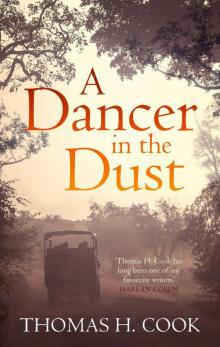 A Dancer In the Dust
A Dancer In the Dust Breakheart Hill
Breakheart Hill The Chatham School Affair
The Chatham School Affair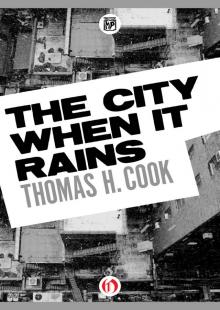 The City When It Rains
The City When It Rains Blood Echoes
Blood Echoes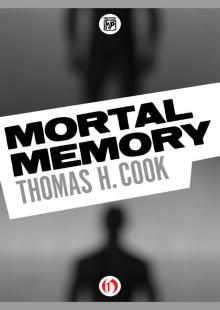 Mortal Memory
Mortal Memory Evidence of Blood
Evidence of Blood Into the Web
Into the Web The Crime of Julian Wells
The Crime of Julian Wells Blood Echoes: The Infamous Alday Mass Murder and Its Aftermath
Blood Echoes: The Infamous Alday Mass Murder and Its Aftermath Night Secrets
Night Secrets Places in the Dark
Places in the Dark The Orchids
The Orchids Elena
Elena Streets of Fire
Streets of Fire Instruments of Night
Instruments of Night Sacrificial Ground fc-1
Sacrificial Ground fc-1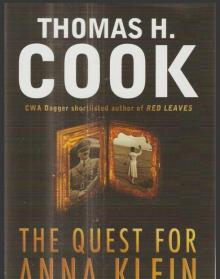 The Quest for Anna Klein
The Quest for Anna Klein Sandrine's Case
Sandrine's Case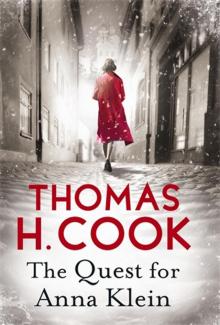 Quest for Anna Klein, The
Quest for Anna Klein, The Fatherhood
Fatherhood Flesh and Blood
Flesh and Blood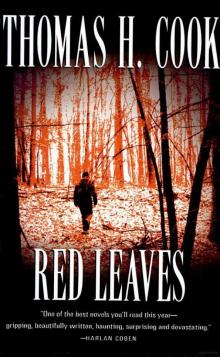 Red Leaves
Red Leaves